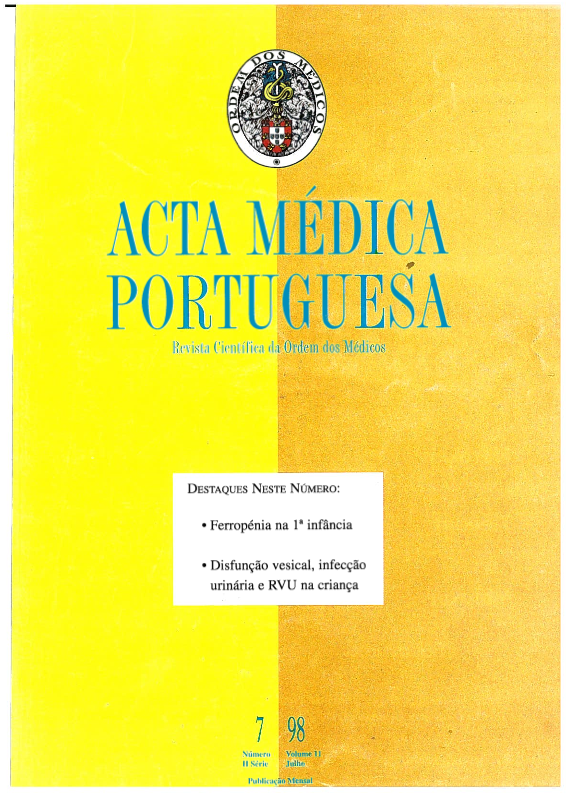Disfunção vesical, infecção urinária e refluxo vesico-ureteral na criança.
DOI:
https://doi.org/10.20344/amp.2305Resumo
A correlation between urinary tract infection, vesicoureteral reflux and voiding disorders has increasingly been reported. Voiding dysfunction increases the incidence of recurrent urinary tract infection, induces and perpetuates vesicoureteral reflux, even after surgical antireflux treatment, and may result in permanent renal damage. The resolution of the primary cause with voiding normalization is essential to achieve good results in the treatment of secondary problems such as urinary tract infection and vesicoureteral reflux. Thirty seven children with vesicoureteral reflux secondary to voiding disorders were diagnosed and treated between 1990 and 1995 (five years). Forty-nine ureters were studied. The subjects became symptomatic between 1 month and 13 years of age, with the occurrence of urinary tract infection. All children were neurologically and morphologically normal. Symptoms suggesting bladder instability were detected in 34 (91.9%) and dysfunctional sphincter obstruction in three (8.1%). These patients were all evaluated with a renal/bladder sonogram and voiding cystogram, complemented in 17 (45.9%) with urodynamic testing that confirmed clinical diagnosis. 99mTc-dimercaptosuccinic acid renal scans performed on 29 (78.4%) children revealed renal damage in 26 (89.6%). A treatment program of bladder retraining and bowel habit normalization was encouraged in every child, anti-cholinergic drugs were associated in 23 (62.2%), muscle-relaxant drugs in three (8.1%), phenoxybenzamine and intermittent catheterization were used in one child (2.7%). Urinary tract infection prophylaxis was instituted in 34 (91.9%) children. Urinary tract infection was completely resolved in 35 (94.6%) patients, and its frequency decreased in two (5.4%). Thirty-two children (86.5%) with vesicoureteral reflux were cured and four (10.8%) were improved. Evidence of voiding disfunction ceased in 22 (59.5%) cases and improved in 14 (37.8%) with a reduction in the frequency and intensity of complaints. Urgency syndrome and vesicoureteral reflux remained unchanged in one child (2.7%). These findings imply that detection and treatment of bladder/sphincter disfunction are essential in every child with the complex of recurrent urinary tract infection and vesicoureteral reflux.Downloads
Downloads
Como Citar
Edição
Secção
Licença
Todos os artigos publicados na AMP são de acesso aberto e cumprem os requisitos das agências de financiamento ou instituições académicas. Relativamente à utilização por terceiros a AMP rege-se pelos termos da licença Creative Commons ‘Atribuição – Uso Não-Comercial – (CC-BY-NC)’.
É da responsabilidade do autor obter permissão para reproduzir figuras, tabelas, etc., de outras publicações. Após a aceitação de um artigo, os autores serão convidados a preencher uma “Declaração de Responsabilidade Autoral e Partilha de Direitos de Autor “(http://www.actamedicaportuguesa.com/info/AMP-NormasPublicacao.pdf) e a “Declaração de Potenciais Conflitos de Interesse” (http://www.icmje.org/conflicts-of-interest) do ICMJE. Será enviado um e-mail ao autor correspondente, confirmando a receção do manuscrito.
Após a publicação, os autores ficam autorizados a disponibilizar os seus artigos em repositórios das suas instituições de origem, desde que mencionem sempre onde foram publicados e de acordo com a licença Creative Commons









